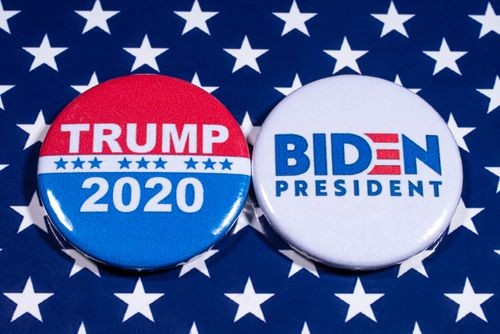What do the American elections mean for the Middle East?
The American elections have dominated international media for a number of months. But will the election of Donald Trump or Joe Biden make a great deal of difference for the Middle East? It may herald some change in the direction of policy, but not much. Donald Trump is clearly the preferred candidate in the UAE and Bahrain, hence the so-called "normalization" deals with Israel. All parties that have "skin in the game" are giving Trump a boost.
Egypt too is supporting Trump, since Biden has tweeted that human rights would be "at the core of our engagement" and that "nations that violate the human rights of their citizens would be held accountable." Trump has also called Egyptian President Abdel Fattah al-Sisi his "favourite dictator". This article looks at Egypt's attitude.
Egypt's pro-state media reignites Clinton email controversy as US vote nears
With the US presidential election just weeks away, Egyptian media outlets loyal to the government have dragged the controversy over former Secretary of State Hillary Clinton's emails back into the headlines.
By Shehira Amin for Al-Monitor
Oct 20, 2020
With US President Donald Trump trailing the Democratic presidential nominee in the polls, Cairo is contemplating the prospects of a Joe Biden electoral victory .
Biden, a former vice president under Barack Obama, has already made clear there would be "no more blank checks" for Trump's "favorite dictator," as Trump had called Egyptian President Abdel Fattah al-Sisi at the G-7 summit in France back in 2017.
Unlike Trump, who has largely turned a blind eye to human rights violations in the region, except in Iran, Biden has tweeted that human rights would be "at the core of our engagement" and that "nations that violate the human rights of their citizens would be held accountable."
Biden has also criticized Egypt's crackdown on activists and human rights defenders. In a comment published via his official Twitter account in mid-July, he stated, "Arresting, torturing, and exiling activists like Sarah Hegazy and Mohamed Soltan or threatening their families is unacceptable."
Hegazy, an LGBTQ rights activist who was detained and tortured after raising a rainbow flag at a Mashrou' Leila concert in Cairo in September 2017, committed suicide in June, apparently as a result of her suffering post-traumatic stress disorder due to her incarceration.
Soltan, a dual Egyptian-American national and former political prisoner in Egypt, has seen several of his relatives, including his father, detained in recent months. The arrests and detentions came after he filed a legal complaint against Egypt's former Prime Minister Hazem Beblawi in June, accusing him of overseeing his alleged torture while in prison.
Soltan is not the only human rights defender to suffer reprisals for his dissent. The latest case is that of Khaled el-Balshy, editor-in-chief of the independent Daarb news site — which is among hundreds of news sites blocked in Egypt — whose brother Kamal was arrested Sept. 20 in retaliation for Balshy's critical journalism, according to the Committee for the Protection of Journalists.
Human Rights Watch researcher Amr Magdi told Al-Monitor by email that Sisi and other Arab leaders believe that if Trump wins, they win.
"This is not just evident in their warm welcoming words for Trump but also in financing his [previous election] campaign according to some media reports," he said in reference to recent news reports of an investigation by US federal prosecutors into whether a state-owned Egyptian bank had pumped $10 billion into Trump's 2016 election campaign. The inconclusive probe went on three years before ending this summer.
"Threatened by the 2011 Arab Spring pro-democracy movement, Arab autocrats have sought to reverse the small, democratic gains of the uprisings in their countries," Magdi lamented.
Magdi, however, does not expect any dramatic changes in US policy toward Egypt and the region if Biden becomes president.
"We know from the Obama era that US foreign policy vis-à-vis the Middle East was not so different" from the policy of the current US administration, he said.
Hisham Kassem, an analyst and former publisher of al-Masry al-Youm, also expressed doubt that a change in US administration would spell any real change in US Egypt policy.
"There would likely be fewer official visits between Egypt and the US and Biden may use tougher language to condemn rights abuses," he told Al-Monitor. "But a Biden administration will, like all previous US governments, only care about safeguarding America's interests, namely the prioritization of US naval vessels through the Suez Canal and access to Egyptian airspace for US military aircraft; no American president will want to jeopardize US relations with Egypt," he added.
Egypt's largely pro-government media has meanwhile made it crystal clear that the state has chosen to side with Trump. In recent days, the Egyptian press has brought Former Secretary of State Hilary Clinton's email controversy back in the spotlight. Various news sites, including state-owned Akhbar el-Youm and privately owned sites like Youm7 and others, published what they claim are "recently declassified emails" that serve as evidence of the Obama administration's alleged support for the Muslim Brotherhood, the Islamic group designated by Egypt as a terrorist organization in late 2013.


Comments 1
This is interesting! Whilst Managing for Xerox in the Middle East & North Africa, covering nine countries sales and marketing, we found it easy to sell Xerox products to Egypt because they had such a large 'AIDS' allocation from the USA. This sponsorship also applied to other Middle Eastern Countries and was a great source of income to American companies like Xerox. I wonder what will happen when this is cut? How will this effect the US companies? What will happen with the ruling royals in this region who made much of their relationship with the States. Time will show which was the best option, keeping them as friends or separating them from the States as looks likely with the present forecast for the US President. Interesting times for sure.